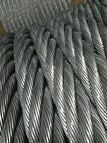 People new to wire rope and cable often have many questions about the various products we offer. Today, we are going to answer questions about Lubricated and Non-Lubricated wire rope and cable.
People new to wire rope and cable often have many questions about the various products we offer. Today, we are going to answer questions about Lubricated and Non-Lubricated wire rope and cable.
Lubricated Cable & Wire Rope
Generally, lubricating a cable is done for two reasons: lowering friction in a cable designed for endurance runs over pulleys, or to assist in weatherproofing. No matter which application you are looking for, the processes are fairly similar. Smaller diameter cables designed for repeated usage over pulleys are generally lubricated during stranding in a lower viscosity lubricant. This will help lower friction during stranding and closing, and will extend the usage life of the completed cable. If you were to then jacket the cable, it will help lock this lubricant between the wires - reducing friction during usage and extending it's cycle life.
Larger wire ropes, mostly galvanized and bright steel, are lubricated in process like the smaller cord. Many applications extend weatherability and lower friction by core lubing the rope during it's usable life. The process is simple - the wire rope is run through the core lubrication machine, where pressure pushes lubricant into the strands of the wire rope. The lubricant used is generally a low viscosity oil, similar in appearance and feel to motor oil, however a viscous oil is sometimes used as well. This process can increase the usage life of a wire rope, especially in an enviroment where it will be exposed to the elements. (Note: lubricating a wire rope to improve weatherability does not make it completely corrosion resistant.)
Non-Lubricated Cable & Wire Rope
Even though it is referred to as "non-lubricated," that terminology isn't entirely correct. Non-lubricated cables are generally stranded with a tiny bit of lubricant - decreasing friction in the manufacturing process. A majority of the time, imported cable is manufactured as non-lubricated, as is our commercial grade cable. Using a non-lubricated cable will decrease endurance life, however, many cable applications still require a "dry" cable that is free of heavy oiled surfaces. If your application calls for "dry" cable, our commercial grade product should satisfy your needs.
Specialty Lubricants
Yes, there are infinite combinations of lubricants we can use. If you are in need of anything from Food Grade applications, to EPA Environmentally Preferred Products we can help you out. Just let us know what you need, and we can make it happen.
Hopefully this will answer some questions regarding wire rope lubricant. Over the years, Loos has seen just about everything when it comes to cables and related products, so if you still have a few lingering questions, feel free to  and we will answer whatever questions you may have. You can check out all of the products we offer at www.loosco.com or contact a product manager to place an order. And to stay updated with the current happenings around at the HotWire!, please
and we will answer whatever questions you may have. You can check out all of the products we offer at www.loosco.com or contact a product manager to place an order. And to stay updated with the current happenings around at the HotWire!, please 



